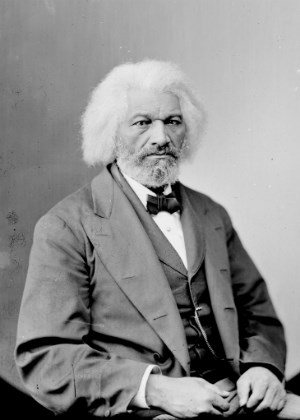Over the course of history, certain figures have emerged as lighthouses for the public, guiding others with their actions, thoughts, and words. Frederick Douglass is one of those people. His activism for racial justice, women's rights, and freedom for all made an impact in the 19th century and has continued to ripple through society for the last hundred years.
Early Life
In order to become a renowned figure of our society, Douglass had to fight. From the moment he was born, he was persecuted by his country and claimed as a slave in the state of Maryland. His barely knew his mother, who died when he was very young, and he never knew his father. He was raised by his grandmother until the age of eight, when he was hired out to work as a servant in Baltimore.
At the time, literacy was known as a gift and was only given to those who were prominent and white in society. Despite this, Douglass was able to take his time in Baltimore as a chance to teach himself how to read. He would sneak and buy books, reading and learning all that he could.
After seven years in Baltimore, he was sent back to his home and forced to work as a field hand. He rebelled instantly, teaching other slaves how to read and write and even fighting back against his enslavers.
Escaping to Freedom
Despite an unsuccessful attempt to escape his captors as a teen, Douglass was determined to gain his own freedom. When he was sent back to Baltimore in his late teens, he met a free, black woman named Anna Murray. She helped him disguise himself as a sailor, board a train, and escape to freedom in New York. He was 20 years old.
As a free man, he started his life in Massachusetts. He married Anna, adopted the last name Douglass and had five children. He found a job in the city and while working, would also attend abolitionist meetings in the area. This was when his career as a speaker started to bud. He would describe his experiences as a slave and his journey to freedom, slowly building a reputation for himself as a orator.
Soon, the Massachusetts Anti-Slavery Society approached him and offered him a job as a public speaker. He accepted and began traveling across the Northwest and Midwest, giving his same speeches that he had done in Massachusetts.
Building a Career
In 1845, Douglass published his first autobiography, Narrative of the Life of Frederick Douglass. It gave his full account about his life, his enslavement, and his plans for the future. As the book began to gain popularity, it caught the eye of his former captors. They began to hunt for him, giving no choice for Douglass but to flee.
For two years, Douglass traveled throughout Europe, selling copies of his book and giving speeches in places like England, Ireland, and Scotland. Eventually, a group of abolitionists purchased his freedom and he returned home to the United States.
Upon his return, Douglass turned his focus to a new issue: women's rights. He began to preach the idea of freedom for both the enslaved and for women who were highly oppressed at the time. As he began to catch the eye of big names in the country, like William Lloyd Garrison, he decided to take his power of language and expand on it even more.
The North Star
In 1855, Douglass bough a printing press and began to run his own newspaper. Named after the idea of the stars guiding slaves home to freedom, he titled it The North Star. The publications surrounded ideas of antislavery and held a motto of "Right is of no sex - Truth is of no color - God is the Father of us all, and we are brethren."
What made the paper such a significant venture for the time was that it was not only owned by an African American, but it primarily featured writing, opinions, and experiences from African American authors, editors, and orators. This was the first paper of this nature that the country had ever seen and it made waves among the journalistic realm.
The paper averaged four pages per publication and was sold for a subscription of $2 per year. It had readers in the United States, Europe, and the West Indies. As it spread, he began to not only include abolitionist issues, but also letters from readers, articles, poetry, book reviews, and advertisements.
The Civil War
When the Civil War broke out in 1861, Douglass used his paper, his influence, and his gift for language to promote the North and encourage African-American men to fight in the U.S. Army. He advocated for equal pay and treatment for black troops and met often with President Lincoln to ensure that freedom and equality would be maintained during the war and the ultimate result of the fighting.
Once emancipation was granted, Douglass didn't stop. He moved to Washington, D.C. to work for the United States government, holding over five different positions and serving under five different U.S. presidents.
Legacy
Douglass passed away in 1895 from a heart attack at the age of 77. Even in his later years, he continued to advocate for women's rights and freedom for all. He wrote three autobiographies over the course of his life and left a lasting impression on the world. To this day, he remains a journalistic hero and a iconic figure for equality in our country.
Sources;
https://www.britannica.com/topic/The-North-Star-American-newspaper
https://www.nps.gov/frdo/learn/historyculture/frederickdouglass.htm

Comments
Post a Comment